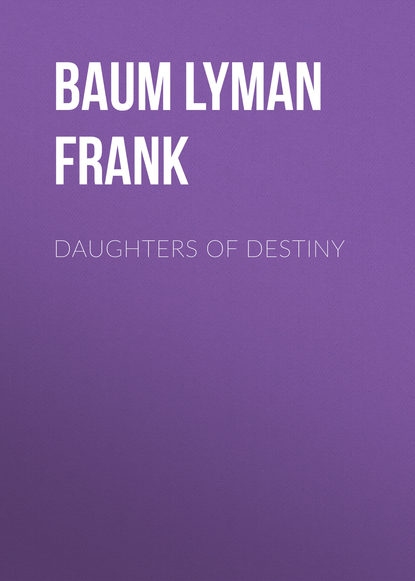По всем вопросам обращайтесь на: info@litportal.ru
(©) 2003-2024.
✖
Daughters of Destiny
Настройки чтения
Размер шрифта
Высота строк
Поля
An hour later one of the prince’s Afghans, selected because he spoke the English language, returned from the caravan to warn Allison that he was in grave danger. The night before a plot had been overheard to murder and rob the young man as soon as his friends had departed.
“If you shoot well and are quick with the knife,” added the Afghan, coolly, “you may succeed in preserving your life till our return. His Highness the Prince sent me to advise you to fight to the last, for these scoundrels of Quettah have no mercy on foreigners.”
Then Allison stared again, rather blankly this time, and the next moment requested the Afghan to secure him a horse.
Kasam was assuring the Colonel for the twentieth time that his son would soon rejoin them when Allison and the Afghan rode up at a gallop and attached themselves without a word to the cavalcade. And the Colonel was undecided whether most to commend the guide’s cunning or his son’s cautiousness.
This portion of their journey was greatly enjoyed by all members of the party. The doctor declared he felt more than ever like an explorer, and the Colonel silently speculated on all that might be gained by opening this unknown territory to the world by means of the railway. The distinct novelty of their present mode of progression was delightful to the ladies, and Aunt Lucy decided she much preferred a camel to an automobile. Even Janet’s pale cheeks gathered a tint from the desert air, and despite the uncertainties of their pilgrimage the entire party retained to a wonderful degree their cheerfulness and good nature.
At the end of four days they halted in a small village where Kasam intended them to rest while he alone went forward to Mekran to obtain their passports. For they were now upon the edge of the Khan’s dominions, and without Burah’s protection the party was liable to interference by some wandering tribe of Baluchi.
The accommodations they were able to secure in this unfrequented village were none of the best, and Allison began to grumble anew, thereby bringing upon himself a stern rebuke from the guide, who frankly informed the young man that he was making his friends uncomfortable when nothing could be gained by protesting.
“You cannot go back, and you dare not go forward without passports,” said Kasam. “Therefore, if you possess any gentlemanly instincts at all, you will endeavor to encourage the ladies and your father, instead of adding to their annoyance. When one travels, one must be a philosopher.”
“You are impertinent,” returned Allison, scowling.
“If I yielded to my earnest desire,” said the prince, “I would ask my men to flog you into a decent frame of mind. If I find, when I return, that you have been disagreeable, perhaps I shall punish you in that way. It may be well for you to remember that we are no longer in Europe.”
The young man made no reply, but Kasam remembered the vengeful look that flashed from his eyes.
Heretofore the prince had worn the European frock coat; now he assumed the white burnous of his countrymen. When he came to bid adieu to his employers before starting for Mekran, Bessie declared that their guide looked more handsome and distinguished than ever – “just like that famous picture of the Son of the Desert, you know.”
Kasam was about to mount his horse – a splendid Arabian he had purchased in the village – when a tall Baluch who was riding by cast a shrewd glance into the young man’s face, sharply reined in his stallion, and placed a thumb against his forehead, bowing low.
Kasam’s brown face went ashen grey. He gazed steadily into the stranger’s eyes.
“You are bound for Mekran, my prince?” asked the tall Baluch, in the native tongue.
“I ride at once.”
“Make all haste possible. Burah Khan is dying.”
“Dying? Blessed Allah!” cried Kasam, striking his forehead in despair. “Burah Khan dying, and our plans still incomplete! I have waited too long.”
“Perhaps not,” retorted the other, significantly. “It is a lingering disease, and you may yet get to Mekran in time.”
“In time? In time for what?” asked Kasam.
“To strike!”
Kasam stared at him. The tall Baluch smiled and shook the rein over his horse’s ears.
“I am of the tribe of Raab, my prince. May Allah guide you to success.”
Kasam did not reply. His head rested against the arched neck of his horse, and his form shook with a slight nervous tremor. But next moment he stood erect. The dazed look inspired by the bitter news he had heard was giving way to his old eager, cheery expression.
“All is not lost!” he said, speaking aloud. “Fate knocks, and I will throw open the door. Allah grant that Burah Khan lives until I reach Mekran!”
He sprang to the saddle, put spurs to his steed and dashed away at full speed into the desert.
“I hope,” said the Colonel, looking after him anxiously, “that nothing has gone wrong.”
CHAPTER III
THE PERSIAN PHYSICIAN
Burah Khan, known as the Lion of Mekran, Headsman of the Nine Tribes of Baluchi and Defender of the Faith, was, without doubt, a very sick man.
He lay upon a divan in the courtyard of his palace, propped with silken cushions redolent of the odors of musk. The waters of the fountain that splashed at his side were also scented with musk, and the heavy and stifling perfume permeated the entire atmosphere of the court. At the head of the divan sat a girl, indolently waving a fan above the head of the Khan. Not far from his feet a white-bearded man squatted upon a rug and eyed the sick one with curious intentness. This was Agahr, the vizier. Behind him sat a group of officers and sirdars, silently watching the scene.
Burah Khan, despite his sad condition, was fully clothed in his customary regalia. He wore a waistcoat of dingy white plush upon which were sewn enough rubies to have ransomed a kingdom. His yellow satin trousers were soiled and crumpled. The long outer robe was of faded rose-color and had nine stars, formed of clustered diamonds, down the front. The deep collar was stiff with masses of the same precious gems. The entire dress seemed as tawdry as a circus costume at the end of the season; but it was of enormous value, and the Khan, with oriental love of magnificence, clung to it even as he lay upon his death-bed.
He was a notable character, this Burah Khan, son of the terrible Keedar Khan who had conquered all of Baluchistan and ruled it with a rod of iron. Burah had inherited with the throne the fierce hatred with which his father was ever regarded; yet he had not only held every province secure, but had won the respect and fear of all his people. The thirty years of his rule had not been void of wars and bloodshed, yet at the head of his nine Baluch tribes the Khan had swept aside all opposition and won for himself the title of “The Lion of Mekran,” Mekran being his dwelling-place when not in the saddle.
Today, gaunt and haggard, he lay gasping upon his divan. His fingers opened and closed convulsively in the meshes of his iron-gray beard; his drooping eyelids were sunk in deep sockets. The pallor of death showed through his swarthy skin. To Agahr and the silent group behind him it seemed that the Khan was conquered at last.
The sick one moved restlessly and raised his hand.
“Has – has – he come?” he asked, speaking the words with much difficulty.
Agahr leaned forward, without rising, and answered his master with composure:
“Not yet, lord.”
It was a question often repeated and as often answered with the same words.
A moan came from the Khan. The vizier noted the patient’s restlessness and made a sign with his hand. At once the curtains of the rear entrance were swept aside and a troop of girls entered. They were robed in white; vines of the mountain iral were twined in their hair; in their hands were bellalas. The girls danced. A tall Arab with immense hoops of gold in his ears beat a tambo to mark the time, and the bellalas chimed a tinkling chorus.
The eyes of the Khan never opened, but he made an impatient gesture and moaned again. The intent Agahr noted this and at his command the noise of the tambo ceased and the girls withdrew. Evidently the Khan could no longer be amused in this fashion.
For a brief space of time the courtyard again became silent. Then, so suddenly that a thrill crept over the watchers, a tall imposing figure glided to the side of the divan and cast a shadow over the face of the sick man.
Burah Khan moved, opened his eyes and fixed his gaze eagerly upon the new arrival. The vizier arose quickly and approached the couch, bowing low and looking into the calm countenance of the stranger with undisguised anxiety. The group of minor officials also looked their interest, and the girl forgot to wave her fan while she examined the person of the man so long awaited.
“The great physician is here, my master,” whispered the vizier. But Burah Khan did not heed him. An expression of relief had come to his pinched features, and his eyes were fixed earnestly upon the face bent above him, as if he would read his fate in the countenance of the famous Persian who had been brought all the way from Kelat to minister to his imperative needs.
The physician raised the sick man’s eyelids and glanced beneath them. He placed his right hand under the Khan’s head and at the same time pressed an ear to his chest. It seemed enough. He stood erect, with folded arms, bending a searching yet kindly gaze upon the face upturned to his.
“Tell me!” pleaded the Khan, feebly.
The Persian gave a quick glance around. Then he answered:
“They listen.”
“Let them hear,” said the Khan, raising himself with an effort upon his elbow. “They – are all – friends.”
A queer look came over the stranger’s face. But he said, in a calm voice:

















